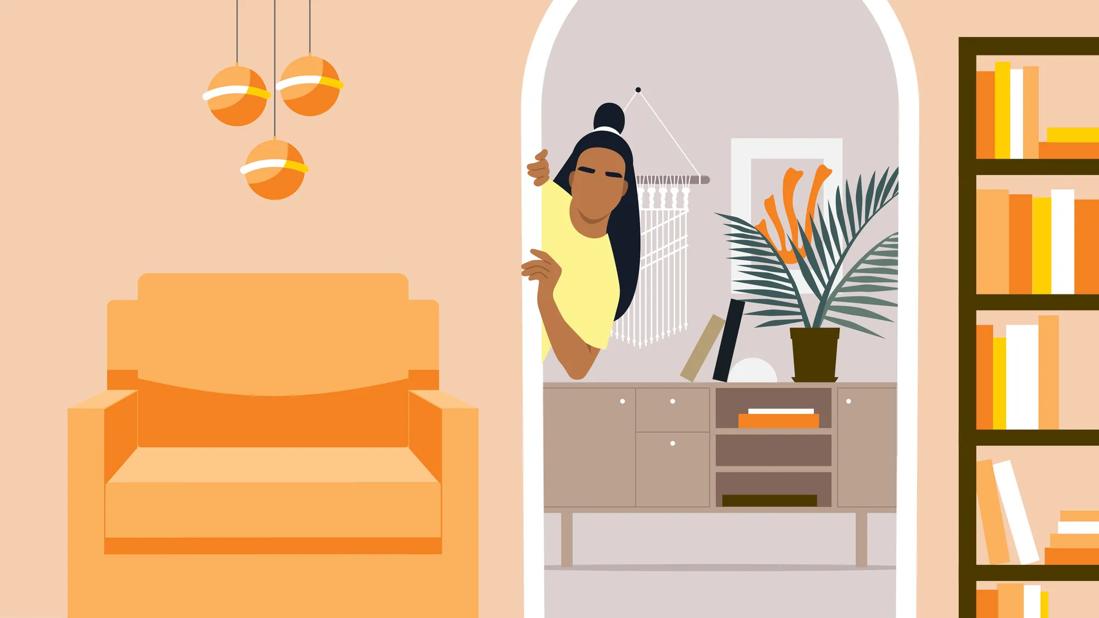When the familiar suddenly feels unfamiliar, it could be nothing — or something worth noting

Image content: This image is available to view online.
View image online (https://assets.clevelandclinic.org/transform/e5781796-f800-4144-9f62-cd74b4d9edae/jamais-vu-1412332618)
Person peeking into their living room from a doorway
Jamais vu is the unsettling sensation that something familiar suddenly feels completely new or strange. French for “never seen,” it’s perhaps best described as the opposite of déjà vu.
Advertisement
Cleveland Clinic is a non-profit academic medical center. Advertising on our site helps support our mission. We do not endorse non-Cleveland Clinic products or services. Policy
While it’s less common, jamais vu is just as fascinating and complex as its more famous counterpart.
“Jamais vu is a false sense of unfamiliarity,” explains neurologist Jean Khoury, MD. “You’re in a setting you know, but your brain fails to recognize it.”
These moments usually pass quickly, but they can leave you feeling disoriented.
It’s worth noting that jamais vu may sound a little like memory loss. After all, when things you should know don’t register anymore, it can be a troubling sign of conditions like dementia or Alzheimer’s disease. But it’s not the same.
“Jamais vu is a feeling of not recognizing something. It’s not that you’ve lost the ability to recognize your surroundings,” Dr. Khoury clarifies. “It’s that there’s a brief pause where you feel out of sorts in your environment.”
Jamais vu can happen in any number of situations, like:
Advertisement
Jamais vu happens when there’s a brief miscommunication between two areas of your brain — your temporal lobes and hippocampus — that are responsible for recognition and memory. It’s the same process that gives rise to déjà vu.
“Jamais vu happens when there’s a disconnect between your senses and your memory. It’s like your brain is playing tricks on you,” Dr. Khoury explains.
Jamais vu happens when there’s a misfire between your temporal lobes (which help you recognize familiar people and places) and your hippocampus (which takes in new information). Your brain can confuse something that’s old for something that’s new for a brief, fleeting moment.
“Both déjà vu and jamais vu are the result of this same missed connection between the temporal lobe and hippocampus. But how you experience that miscommunication is different,” he continues.
Instead of that unsettling feeling that you’ve seen or experienced something before, you feel like you’ve never seen it — despite knowing that you have.
Jamais vu can be harmless — nothing more than a random glitch in your brain matrix. Or it can be a sign that something else is going on.
Potential triggers include:
Experiencing a few moments of jamais vu once or twice a year? Probably nothing to worry about.
But if you notice it happening more regularly — or lasting longer — it’s worth mentioning to a healthcare provider.
“Episodes that happen more frequently or that last longer than a few seconds can be a red flag,” Dr. Khoury states.
That’s especially true if jamais vu episodes come with other worrying symptoms, like:
If you’re unsure whether your experience is typical, trust your intuition: “If it’s enough to make you think about talking to a healthcare provider, that’s probably a sign that it’s worth bringing up,” Dr. Khoury emphasizes.
Advertisement

Sign up for our Health Essentials emails for expert guidance on nutrition, fitness, sleep, skin care and more.
Learn more about our editorial process.
Advertisement
Decreasing estrogen levels can cause brain fog, but symptoms of dementia are different and more pronounced
Use a gentle, nonjudgmental tone, focus on prevention and reassure them that age-related memory issues can have a variety of causes
The brain areas that process smell are closely connected to those responsible for our memories and emotions
Our collective misremembering of events comes from a surplus of false memories
Cardio is great for improving cognition, but strength and balance training are just as important
The difference between normal aging and issues that affect your independence
And 12 easy tips that can pay off big
Those nursery rhymes and song lyrics are worth while
Prioritize your health by managing stress, strengthening your social connections and getting quality sleep
Bolsters, blankets, pillows and blocks can offer extra support, stability and comfort
Allergies, postnasal drip, asthma or reflux could be to blame for a cough that won’t quit